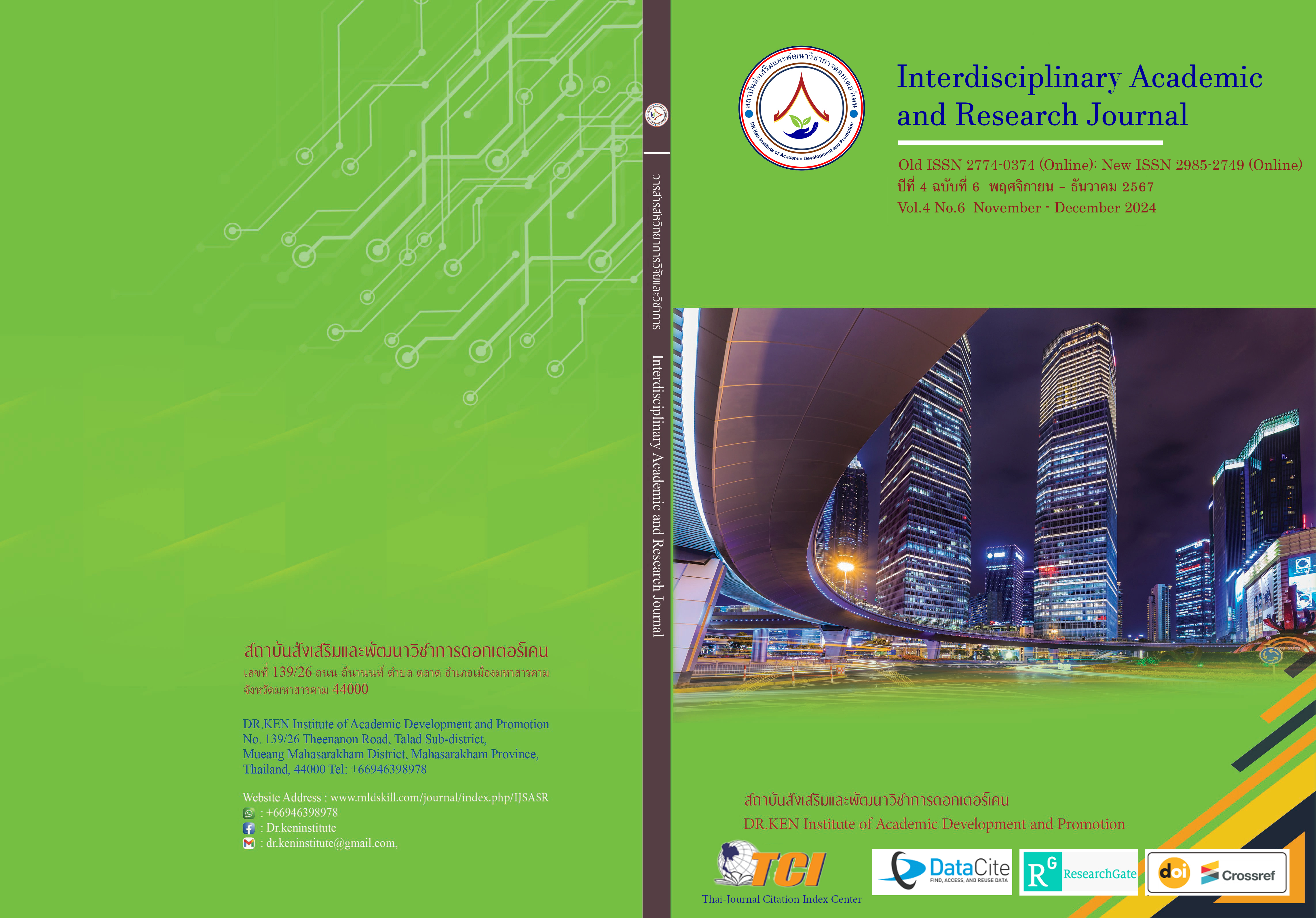The Guidelines Development for Democracy of Secondary Schools under the Mukdahan Secondary Educational Service Area Office
DOI:
https://doi.org/10.60027/iarj.2024.280002Keywords:
Development Guidelines, Promoting Democracy, Secondary SchoolsAbstract
Background and Aims: Promoting democracy in educational institutions involves teaching students about the democratic political system with the king as the head of state. This includes understanding the characteristics and importance of being a good citizen and recognizing cultural differences and diversity, values, and beliefs. It involves instilling democratic values under a constitutional monarchy, understanding rights, duties, and freedoms, and living peacefully in Thai society and the global community. The aim is for students to act according to their civic duties, cultural practices, and ways of life in society. Therefore, this research aims to study the state of promoting democracy in secondary schools under the Mukdahan Secondary Educational Service Area Office and the guidelines for the development of democracy in secondary schools under the Mukdahan secondary educational service area office.
Methodology: The research employed research and development methodology and was divided into two phases: Phase 1; to study the state of promoting democracy in secondary schools. The sample group of 285 were 30 school administrators and 255 teachers by stratified random sampling. The research tool was a questionnaire, with a reliability of 0.87, and a discrimination power of 0.27 – 0.82. The statistics used for data analysis were mean and standard deviation. Phase 2; to study the development guidelines for promoting democracy in secondary schools. The key Informant groups elected through purposive sampling, Include 9 experts for studying the development guidelines and 7 experts for evaluating guidelines. The research instrument were interview form and evaluation form the suitability and feasibility.
Results: 1. The promotion of democracy in secondary schools is at a high level, ranked from highest to lowest as follows: 1) Thainess 2) Patriotism, adherence to religion, and reverence for the monarchy 3) Self-discipline 4) Harmony and unity 5) Good citizenship in a democratic system. 2. The promotion guidelines comprise 15 approaches: 1) Thainess: 3 guidelines 2)Patriotism, religious adherence and reverence for the Monarchy: 3 guidelines 3)Good citizenship in a democracy: 3 guidelines 4) Harmony and reconciliation: 3 guidelines 5) Self-Discipline: 3 guidelines In summary, the evaluation of the suitability and feasibility of these guidelines is at the highest level.
Conclusion: Students learn about the political system of democracy with the King as the Head of State, the characteristics and importance of being good citizens, and the differences and diversity in culture, values, and beliefs. They are instilled with democratic values under a constitutional monarchy, an understanding of rights, duties, and freedoms, and how to live peacefully in Thai society and the global community. This education aims to enable students to effectively fulfill their civic duties, cultural practices, and ways of living in society.
References
ตรีวิเศษ ทัพไทย. (2549). การพัฒนาการดำเนินงานเพื่อเสริมสร้างวิถีประชาธิปไตยนักเรียนด้านสามัคคีธรรมโรงเรียนพยัคฆภูมิวิทยาคาร อำเภอพยัคฆภูมิพิสัย จังหวัดมหาสารคาม. การศึกษาค้นคว้าอิสระการศึกษามหาบัณฑิต มหาวิทยาลัยมหาสารคาม.
นิติรัฐ โสตานิล. (2540). บทบาทของผู้บริหารในการสร้างเสริมประชาธิปไตยในโรงเรียนประถมศึกษาสังกัดสำนักงานการประถมศึกษาจังหวัดสระบุรี. วิทยานิพนธ์ครุศาสตรมหาบัณฑิต มหาวิทยาลัยเกษตรศาสตร์.
บุญชม ศรีสะอาด. (2556). การวิจัยเบื้องต้น. พิมพ์ครั้งที่ 9. กรุงเทพฯ : สุวีริยาสาส์น.
วีระชัย อุดรแผ้ว. (2540). การศึกษาการสร้างเสริมประชาธิปไตยในโรงเรียนมัธยมศึกษา สังกัดกรมสามัญศึกษา:ศึกษาเฉพาะกรณีโรงเรียนตลาดวิทยาคาร จังหวัดกาฬสินธุ์. วิทยานิพนธ์การศึกษามหาบัณฑิต มหาวิทยาลัยมหาสารคาม.
สำนักงานคณะกรรมการการเลือกตั้ง. (2557). แนวทางการใช้คู่มือการจัดกิจกรรมการเรียนรู้ประชาธิปไตย หลักสูตรรายวิชาเพิ่มเติมหน้าที่พลเมือง. กรุงเทพฯ : ศูนย์เฉลิมพระเกียรติ 80 พรรษา.
สำนักวิชาการและมาตรฐานการศึกษา. (2557). แนวทางการประเมินคุณธรรมของผู้เรียน. ฉบับปรับปรุง . กรุงเทพฯ : โรงพิมพ์ชุมนุมสหกรณ์การเกษตรแห่งประเทศไทย จำกัด.
Cronbach, L.J. (1970). Essentials of Psychological Testing. 3rd edition. New York: Harper. And Row.
Krejcie, R.V. & Morgan, D.W. (1970). Determining Sample Size for Research Activities. Educational and Psychological Measurement, 30, 607-610.
Downloads
Published
How to Cite
Issue
Section
License
Copyright (c) 2024 Interdisciplinary Academic and Research Journal

This work is licensed under a Creative Commons Attribution-NonCommercial-NoDerivatives 4.0 International License.
Copyright on any article in the Interdisciplinary Academic and Research Journal is retained by the author(s) under the under the Creative Commons Attribution-NonCommercial-NoDerivatives 4.0 International License. Permission to use text, content, images, etc. of publication. Any user to read, download, copy, distribute, print, search, or link to the full texts of articles, crawl them for indexing, pass them as data to software, or use them for any other lawful purpose. But do not use it for commercial use or with the intent to benefit any business.
















.png)


